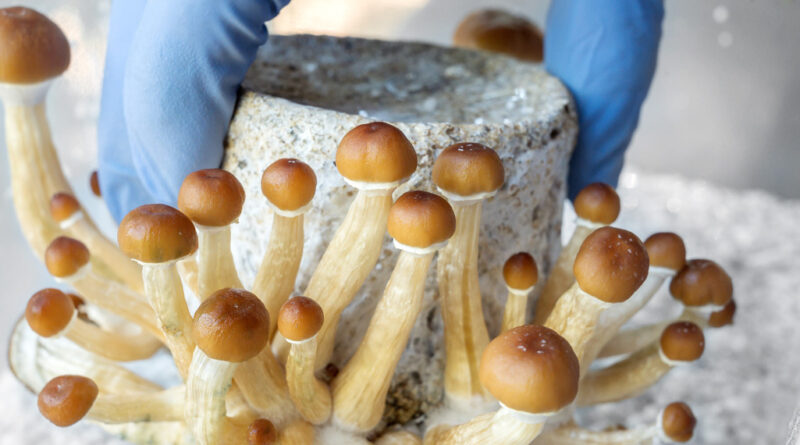Psilocybin’s mental health benefits may include improved sleep
Research into psilocybin’s promise as a mental health treatment is expanding beyond mood disorders. In a new study, researchers found that participants who consumed a psychedelic substance in therapy reported a reduction in stress and an improvement in their sleep quality. The findings were published in Current Reports in Psychiatry.
Psilocybin is a natural compound found in certain types of mushrooms, often called “magic mushrooms.” When ingested, psilocybin is converted in the body to psilocin, which interacts with serotonin receptors in the brain. This interaction leads to changes in perception, perception and perception. These effects are often described as psychedelic, producing vivid visual and auditory experiences, changes in self-awareness, and deep emotional or spiritual understanding.
Scientists are particularly interested in psilocybin because of its potential to treat mental health conditions such as depression, anxiety and post-traumatic stress disorder. Unlike conventional antidepressants, which can take weeks to show effects and often require long-term use, psilocybin has been shown in early studies to produce rapid and lasting improvement in mood after a single session. or just two. This has led researchers to investigate its mechanisms of action.
The new study, led by Matthew J. Reid and Robin Carhart-Harris, aimed to better understand whether psilocybin improves the quality of sleep and whether early sleep disturbances influence the antidepressant effects of psilocybin.
“My research is focused on understanding the relationship between sleep disruption and mental health, and how sleep how does it fit into the therapeutic process.”
“In particular, I’m interested in how we can use sleep as a new therapeutic tool to replace medical treatments or improve their effectiveness. Exploring how this relationship can be expanded and intervened while psychedelic seemed natural, and I was surprised that no one had examined how psilocybin affects long-term sleep.
The researchers recruited 653 participants who planned to attend psilocybin-guided sessions, such as retreats or ceremonial experiences, making this one of the largest studies ever to investigate the use of psilocybin. of psilocybin in natural, non-clinical settings.
About 60 percent of participants encountered the possibility of major depression, with the average level of depression falling into the mild to moderate range. Sleep disturbances were nearly universal, with all participants reporting some sleep-related issues. Insomnia, especially difficulty falling asleep, was the most common sleep complaint, followed by hypersomnia and early awakening. Notably, for 26% of participants, sleep problems were their most severe depressive symptom.
“We were very surprised to find that sleep symptoms appeared to moderate the level of depressive symptoms among this group,” Reid told PsyPost. “Sleep disturbance is a frequent symptom of depression, but here, sleep disturbance was the strongest symptom of depression—even stronger than symptoms such as ‘ feeling down or sad,’ which we normally associate with depression.”
Consistent with previous studies, researchers found that psilocybin reduced depressive symptoms in participants. By two weeks after the session, depression symptoms had decreased by an average of 33%, and by four weeks, they had decreased by more than 50%. These improvements were more pronounced in participants who started with severe depression.
Sleep disturbances also improved after the use of psilocybin, although the changes were less pronounced than those observed for depression. Participants reported a modest but statistically significant reduction in problems such as insomnia and early awakening. These improvements were visible in two weeks and remained stable for four weeks.
“There seems to be a small but reliable improvement in sleep after the administration of psilocybin in the treatment area,” Reid explained. It is still unclear whether this is due to the drug itself or something indirect, and we cannot tell that from the data.
An important finding was the relationship between basic sleep disturbances and depression outcomes. Participants who had severe sleep problems at baseline were less likely to find relief from depression, even if their depression symptoms improved.
For example, people with insomnia or hypersomnia were less likely to recover completely. This suggests that sleep disturbances may interfere with the therapeutic effects of psilocybin, which may be an obstacle to obtaining optimal results.
“Those with poor sleep seem to benefit less from psilocybin administration, which may have important implications for future clinical applications,” Reid told PsyPost. “But it’s not clear why this happens, and we need to study this in more detail.”
Studies highlight the importance of sleep meditation as a factor in psilocybin-assisted psychotherapy. However, as with all research, there are limitations to consider.
The lack of a control group makes it difficult to isolate the effects of psilocybin from other factors, such as the supportive recovery environment or participants’ expectations. Similarly, natural settings have introduced differences in dosing, retreat protocols, and participant populations. Although this method improves the validity of the ecological study, it also complicates efforts to reach accurate conclusions about the effects of psilocybin.
Reid said: “It is important to remember that these results were obtained ‘in the field’ from people who voluntarily administered psilocybin. “This was not a controlled trial conducted in a laboratory setting, like a clinical trial, so we need to account for the potential bias, uncertainty, and low noise ratio inherent in this type of naturalistic research.”
The long-term goals of this research method are to “continue to explore what role sleep, if any, may play in the mechanisms of psychedelic therapy,” Reid explained. “We have several studies underway in that area and hope to share more findings soon.”
The study, “Preliminary Evidence of Sleep Improvement Following Psilocybin Administration, and Its Implications for the Treatment of Depression,” was written by Matthew J. Reid, Hannes Kettner, Tessa F. Blanken, Brandon Weiss, and Robin Carhart-Harris.
#Psilocybins #mental #health #benefits #include #improved #sleep
